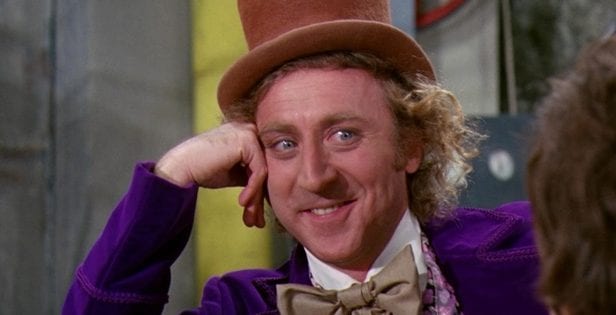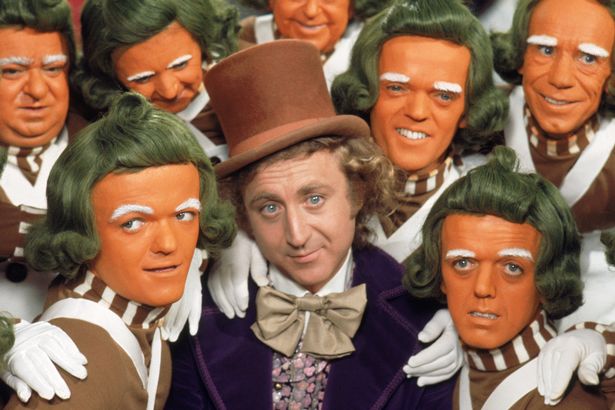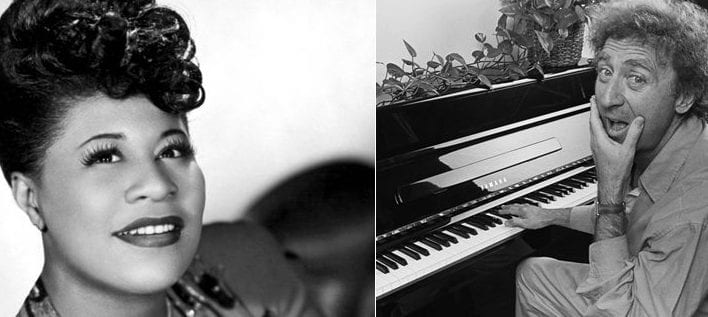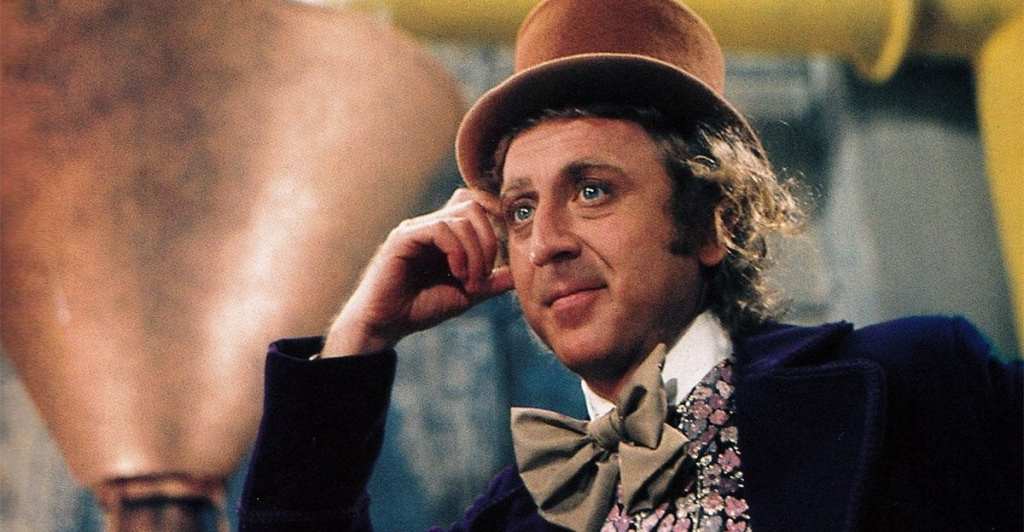There’s no earthly way of knowing which direction we are going. We live, and we learn, and we love, and we die. Most of the time, we run around acting like we’re the center of the Universe, but we actually have no idea what the hell we’re doing.

One of the smartest and most relentlessly curious beings in human history wrote in one of his centuries-old-yet-still-famous notebooks: “While I thought I was learning how to live, I have been learning how to die.” So you see, even Leonardo da Vinci didn’t know what the hell he was doing.
But Gene Wilder knew what the hell he was doing. Always.

OK, probably not always. I don’t know the man, obvs. He was a human being, after all, and therefore fallible and amply filled with moments of cluelessness. But there are three instances in his life that I feel are worth mentioning now, as I sit here ugly crying at my desk. One of them involves his creation of Willy Wonka, and the other two involve his recent death. I’ll start with Wonka and get to the death stuff later. I know. The suspense is terrible. I hope it’ll last.

Photo Credit: abcnewsgo.com
#1. Wielding Willy Wonka
Gene Wilder, for me, invented Willy Wonka. Yes, I am aware that technically Roald Dahl invented him, which was no easy task and has not gone unnoticed by me. But the old curmudgeon clearly didn’t know a beautiful thing when he saw it, because he hated the movie for making so many changes to his story.

Photo Credit: Paramount Pictures via Everett Collection
On the one hand, I understand. However, it’s not like they went all ‘Hi-I’m-Stanley-Kubrick-and-I’m-going-to-smash-Stephen-King’s-vehicle-before-his-very-eyes-on-a-giant-screen-to-establish-dominance-and-make-it-MINE’ on him. (If you’ve read/seen The Shining, I’m referring to the whole VW Beetle fiasco, which was a total dick move, IMHO.) Yet Dahl still described Wilder’s portrayal of Willy Wonka as “pretentious” and “bouncy.” A description I refuse to accept, because, as I said before, Gene Wilder invented my Willy Wonka, and invention, my dear friends, is 93% perspiration, 6% electricity, 4% evaporation, 2% butterscotch ripple, and 105% Gene Wilder.

Photo Credit: abcnewsgo.com
Mr. Wonka would not have been who he was without Wilder, which goes without saying – but the man’s genius not only changed the original script of the film, it shaped the resonance of his character and the overall meaning of the story.
When Mel Stuart, director of the 1971 classic, offered Gene the title role in the film, he presented Stuart with an interesting stipulation. It went something like this:
Wilder: Well, I like the script – except when the audience sees Willy Wonka for the first time, I want to come out of a door, with a cane, and limp my way to the crowd. And they’re all ‘Oh, Willy Wonka he’s incredible oh my God crippled I never knew [hubbub hubbub],’ and they quiet down, quiet down, quiet down, and then Willy Wonka’s cane gets stuck in a brick, and he starts to fall forward, and he does a forward somersault then jumps up, and the crowd cheers and applauds.
Stuart: Whaddaya wanna do that for??
Wilder: Because from that time on, no one will know whether I’m lying or telling the truth.
Stuart: You mean, if I say ‘No’ you won’t do the picture?
Wilder: I’m afraid that’s the truth.
I’m sure he told that story hundreds of times in his life, so who knows if it really happened that way, but the idea of utilizing that vague, quiet deception was his- and he couldn’t have been more right. Think about it: If Willy Wonka isn’t kind, and gentle, and captivating, and yet completely mysterious and untrustworthy, the entire story wouldn’t matter.

Images Photo Credit: Paramount Pictures
Wonka needed to find one child, just one, to remain honest and do the right thing in spite of what everyone else was doing, even in the presence his ill-behaved icon – but if said icon is just silly, flippant, apathetic, and predictable (:cough: Johnny Depp, ahem :cough cough:) then what the hell is the point? If Wonka behaves in a way that suggests he’s not enamored with the world he’s created, if he doesn’t seem to CARE, why should Charlie? The other kids already don’t, Grandpa Joe is all high on Celebrex or something, and Charlie is confused AF. So, aside from being poor and needing some cash, why should he really care?

Images Photo Credit: Silver Screen Collection/Getty
Willy Wonka, that’s why. His passion for life, his legacy, and the children of the world, which is expertly disguised with a well-planned and deceptive facade in order to lure the perfect unicorn out of a magical forest, is what made that movie so special. Wilder’s Wonka was many things, but it was absolutely not a caricature designed to visually entertain children while barely penetrating their skulls. He knew this entirely (which is one of the reasons he didn’t care for the film’s remake), and he gave that gift to us. He gave it to me as a child, I still have it as an adult, and now he gives it to my child (whose name is Charlie, btw). It’s all there, black and white, clear as crystal, and I can’t thank him enough for that.
#2. Championing the Children
I initially wanted to write this article to tell you a couple of wonderful things regarding his death, but I realized I needed to preface them with that last bit of information for reasons you will soon understand. OK, let’s move on then. We have so much time and so little to do. Wait a minute – strike that. Reverse it.

Photo Credit: abcnewsgo.com
Here’s where the man and his legacy become a whole lot more special in my eyes.
Wilder’s death was somewhat of a surprise to the public, because we didn’t know he was sick. Because he purposely didn’t tell us. Because – ohhh, lord, the waterworks; they flow – he didn’t want kids to know. He was diagnosed with Alzheimer’s disease three years prior to his death, but, according to his nephew, he wanted to prevent children from knowing about the disease, because “he simply couldn’t bear the idea of one less smile in the world.”

Images Photo Credit: Silver Screen Collection/Getty
Stop right there, because my heart just died. Here comes dat boi again, truly worrying about the well being of our children. He knew that you can’t simply look around and view paradise when Willy freaking Wonka is deteriorating in front of your eyes, or worse, his own. So he said nothing. So shines a good deed in a weary world.
#3. Leaving With a Lullaby
That brings me to the final circumstance (literally, as you’ll see) I want to share with you, because good deeds do not go unnoticed. Gene Wilder passed away holding the hands of his family, all of whom surrounded him in adoration.

Photo Credit: Irish Mirror
As he took his last breath, one of his favorite songs called to him from the music player, which was set to random. Wilder had met Ella Fitzgerald some years ago, and a picture of the two of them is one of his family’s most cherished possessions. And, as if the Universe reached out to bestow some sort of existential gift upon this man in return for those he gave to us, Ella crept her way through all those randomly queued songs and began to sing Somewhere Over the Rainbow as he faded away.

Photo Credit: George Rose/Getty Images
Stop crying for a second, and think of the parallels between his iconic character and that equally-iconic song. “Where troubles melt like lemon drops” – like candy – much unlike the Everlasting Gobstopper, which never melts and actually caused Wonka some significant troubles. It even parallels the lyrics of Pure Imagination: “Somewhere over the rainbow, way up high, there’s a land that I heard of once, in a lullaby.” “Living there, you’ll be free if you truly wish to be.” “Someday I’ll wish upon a star.” “Hold your breath, make a wish, count to three.”

Photo Credit: Paramount Pictures
Music has an otherworldly way of sweeping us up over the rainbow in an instant. I think Wilder knew that too, because he wanted to find the child in all of us. He wanted us to dream, and imagine, and love, just like Wonka and Charlie did. He wanted us to make our own music, because he knew that we are the music makers, and we are the dreamers of dreams… and the dreams that you dare to dream really do come true.
UGLY. CRY. For the love of God, somebody please bring me a bottle of gin. I mean, candy is dandy, but liquor is quicker.

Photo Credit: Giphy






